 |
| The good earth: The mineral-rich
content of this rocky and rain-starved region has changed
Bellary's fortunes |
15°16'N
76°26'e: Hospet, a small, dry, dusty town 353 km northwest
of Bangalore, in Karnataka's Bellary district. A few thousand
people do look up the co-ordinates on the map every year; Hospet
is eight km away from the ruins of Hampi, all that remain of the
Vijayanagar Empire that flourished in this part of the world between
the 14th and the 16th centuries ad, the nearest outpost of civilisation
for tourists keen to get a whiff of history. Yet, tourism has
nothing to do with the boom currently on in Hospet (literally,
new town); the reddish dust that falls off the perilously overloaded
trucks that negotiate the town's lunar landscape, and which is
eagerly scooped up in pans by the populace, does. The dust is
a mixture of sand, rocks, and fine iron ore and is the closest
you can get to panning for gold in Hospet. In 2005-06, iron ore
exports from the Bellary district totalled 35 million tonnes;
India's total exports of the commodity, 80 million tonnes. The
lone branch of the State Bank of India in Hospet handled foreign-exchange
transactions worth some Rs 1,400 crore (almost all of it, inflows)
in the same period. For a town with a population of around 150,000,
that's a bit. The rich of Hospet and Bellary, the eponymous town
that's the largest in the district, mining magnates mostly, have
it all: mansions, cars, aircraft, even political currency-the
buzz in the two towns and in Bangalore is that the ruling government
in Karnataka, the H.D. Kumaraaswaamy-led alliance of the JD(S)
and the BJP, is propped up by the mining lobby. That roster of
achievements is no mean feat for a district that is among the
most backward in the state.
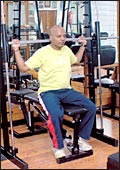 |
| In the fitness of things: KMMI's
Wahab showcases his ultra-modern home gym, but won't talk
about numbers |
Bellary isn't exactly the most salubrious
place on earth. In summer, the thermometer can touch 46 degrees
(Celsius) in the shade. Rainfall is scanty. The land is rocky
and not suited for agriculture. What the district lacks in terms
of these, however, it makes up with an abundance of mineral resources,
both metallic (think: iron ore, manganese ore, red oxide, copper,
lead, even gold) and non-metallic (quartz, limestone, granite
and the like).
Iron ore isn't a rare mineral in India; it
is also available in states like Orissa, Goa, and Jharkhand. If
Bellary's ore has anything going for it (and it has), it is the
grade, or the proportion, by weight, of ferrous content. This
number is between 35 per cent and 50 per cent for ore available
in most parts of India; it is 67 per cent for that in Bellary.
"The haematite ore (chemical composition: Fe2O3) available
here is ideally suited to making steel as opposed to the magnetite
(Fe3O4) ore common elsewhere," explains Meda Venkatiah, President,
Mining Engineers Association of India. It is also easier and less
expensive to remove the impurities in higher-grade ore and convert
it to steel. Hospet's boom, however, wouldn't have been if several
things hadn't happened.
The first was China. Although the country
had been importing iron ore for some years, it was only in 2002,
spurred by a booming economy's near-insatiable appetite for steel,
that it really started buying in some volume. In the four years
since, China's steel-making capacity has grown from 130 million
tonnes a year to 350 million tonnes.
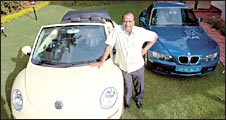 |
| One of 14: And the newest
too, the VW Beetle is the favourite of Bellary Iron Ore's
Modi |
The second was the preference the Chinese
had for fine ore (termed Fines in industry lingo). Japan, which
along with South Korea, was a large importer of iron ore before
China emerged on the scene, preferred lumps (rocks or ore between
40 mm and 200 mm in diameter). The third was the spurt in ore
prices, engendered, in large part, by the first factor, China's
hunger for the commodity: from around $16 (Rs 752) a tonne in
2001, ore prices touched a high of $95 (Rs 4,275) in February
2004 and currently move between $45 (Rs 2,070) and $52 (Rs 2,392).
The last was the government's decision, in
1986 to allow companies to directly export ore without routing
it through the state-owned MMTC (formerly Minerals and Metals
Trading Corporation), one influenced by years of lobbying by Abheraj
Baldota, a now-deceased businessman originally from Pune. "Some
of the strictures imposed on us while permitting us to export-not
being allowed to export to countries with whom MMTC was already
doing business-turned out to be a blessing," says Narendra
Kumar Baldota, Abheraj's son and now the Chairman and Managing
Director of MSPL (formerly Mineral Sales Private Ltd). And so,
in 1997, MSPL bagged its first order, a small one, from China.
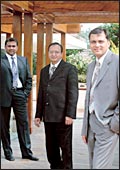 |
| Dressed for the IPO: MSPL's
(from left) Shrenik, Narendra Kumar and Rahul Baldota have
filed a Red Herring prospectus |
It doesn't take much to mine iron ore. Anyone
wishing to do so would require mining licences, still sometimes
granted as a favour by the political establishment, some mechanised
earth digging equipment, and a logistics network that can ship
the ore to the nearest port. Demand (from China) and soaring prices
ensure success. For instance, in 2005-06, MSPL exported 6 million
tonnes of ore and earned a net profit of Rs 450 crore on a turnover
of Rs 1,100 crore.
It isn't just the Baldotas of MSPL who are
working the new alchemy of turning iron to gold to their advantage;
in 2005-06, Santosh Kumar Modi's Bellary Iron Ores Pvt. Ltd and
vg Mines Pvt Ltd exported 2.2 million tonnes of ore and earned
a net profit of Rs 150 crore on revenues of Rs 560 crore. Sajjad
Wahab's KMMI Group exported 3.2 million tonnes and registered
revenues of Rs 1,500 crore (the man will not share information
on profits). And PVG's Prasanna V. Ghotage has built a Rs 800-crore
company (net profit in 2005-06: Rs 65 crore) around managing the
logistics need of the mining firms; he commands a fleet of 3,000
trucks, two railway rakes (each with 58 wagons, and eight more
rakes are on the way), and goes under the entirely understandable
moniker of 'logistics king' in this part of the world. Bellary
is landlocked, and the ore has to be transported to Mangalore,
Goa, even Chennai, to be shipped out.
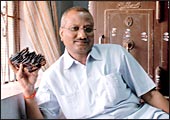 |
| Closer home: G.G. Brothers'
Gogga Channabasava Raj prefers supplying to Indian steel mills |
There's visible sign of all that money in
Hospet. The Baldotas have spent Rs 10 crore on a Cessna single-engine
turbo-prop and ordered a Cessna Jet cj1 at double the price (they
have also built an airstrip). "It is a business requirement,
not a luxury," says Rahul Baldota, Executive Director, MSPL,
and Abheraj's grandson. Bellary Iron Ore's Modi is an auto aficionado
and boasts a garage of 14 cars, including a VW Beetle convertible
that is the latest addition to the fleet and the current favourite.
He travels around in a P68C, a six-seater twin-engine aircraft
but on the day this reporter meets him, is finalising a deal to
acquire a Beech King B2-100 twin-engine aircraft for Rs 23 crore.
And KMMI's Wahab has a home gym that could be straight out of
the pages of an international fitness publication.
Still, Bellary's mining magnates are uncomfortable
talking about their wealth. KMMI's Wahab is unhappy with a report
in some newspapers that the district's mine owners have ordered
between 25 and 30 helicopters. "That is simply not true,"
he says. He shakes his head to express his feelings and adds,
"This is a small place and it (such reports) can create problems."
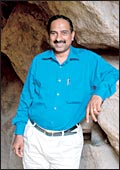 |
| Truckin' it in: PVG's Ghotage
is the local 'logistics king' and commands a fleet of 3,000
trucks |
One problem is extortion calls from the underworld.
Modi, for instance, asked for and has been accorded 24X7 police
protection for himself and his family. "There were some problems,"
he admits, hinting at the calls, "but everything has been
sorted out now." "There has been plenty of trickle-down
wealth," adds Srinivas Rao, Managing Partner, Sri Srinivasa
Minerals Trading Company (2005-06 revenues: Rs 160 crore). "But
there is a lot of poverty in this area."
Mineral wealth, like spectrum, is considered
a national resource in India, which is why companies wishing to
mine iron ore need to acquire mining licences from the government
(the state government of Karnataka in this case). Most mining
magnates are politically well connected. For instance, Santosh
Lad, whose family runs V.S. Lad and Sons, a mining firm, is political
secretary to H.D. Kumaraaswaamy, the current Chief Minister of
Karnataka. His cousin Anil Lad, who also has interests in the
mining business, is a member of the state's legislative assembly
(an MLA; he belongs to the BJP). And the Member of Parliament
(MP; also BJP) from Bellary, Karunakara Reddy, also comes from
a family with interests in mining. Santosh Lad sees nothing strange
in this and insists that his family entered mining first, politics
later. "Mining is just a business," he says. "Politics
is to serve the people."
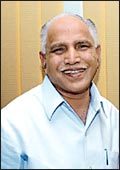 |
| Read my lips: Illegal mining
activity will be checked, insists Karnataka's Deputy CM Yediurappa |
Bellary is also high up in the list of preferred
postings for a bureaucrat. The district is witness to rampant
illegal mining on government land, and it pays to look the other
way when such work is in progress. Most major mining companies
attribute such activity to small-time buccaneers, but a senior
bureaucrat insists that "illegal mining is rampant and several
hundred crores of mineral wealth is being looted (every year)".
He adds that the government itself has been propped up with money
from the mining lobby. The state's Deputy Chief Minister B.S.
Yediurappa pooh-poohs the allegations. "Illegal mining, wherever
it is happening, will be stopped," he says. "We will
take strict action against the offenders." In the past year,
242 cases of illegal mining were registered and a fine of Rs 1.42
crore levied. However, the state government is yet to take a call
on increasing royalties being paid by the miners to it, Rs 27
a tonne for lumps and Rs 19 for fines (as compared to export market
rates of $52 and $45, respectively.)
 |
| Ore to hotels: Sri Srinivasa's
Rao wants to set up a statewide hospitality chain |
In a bid to enter the corporate mainstream
and earn some respect, Bellary's billionaires are pulling out
all stops. The Baldotas are investing Rs 2,200 crore in an integrated
speciality steel plant. MSPL has already filed a Red Herring prospectus
with the Securities and Exchange Board of India and will launch
a public offering to sell a 20 per cent stake "once the markets
settle down", according to Narendra Kumar Baldota. The money,
he adds, will also help the company acquire mines in other countries.
Modi has already invested Rs 100 crore in a beneficiary plant,
a pelletisation unit, and a sponge-iron facility. kmmi's Wahab
owns a sponge iron plant and steel mills. And while some of the
others are investing in steel plants, Srinivas Rao is planning
to invest in a chain of hotels across the state.
Will the party continue? The mining magnates
think so, unless the Chinese economy slows down. "Even then,"
says Wahab, "present prices will continue." And reports
that India may ban the export of high-grade ore as it tries to
increase steel-making capacity from 42 million tonnes a year now
to 110 million tonnes by 2020, claims Rahul Baldota, are part
of the "scare-mongering" tactics of a "powerful
steel lobby that has its own vested interests". And when
it comes to lobbies, Bellary's billionaires can probably hold
their own.
|











